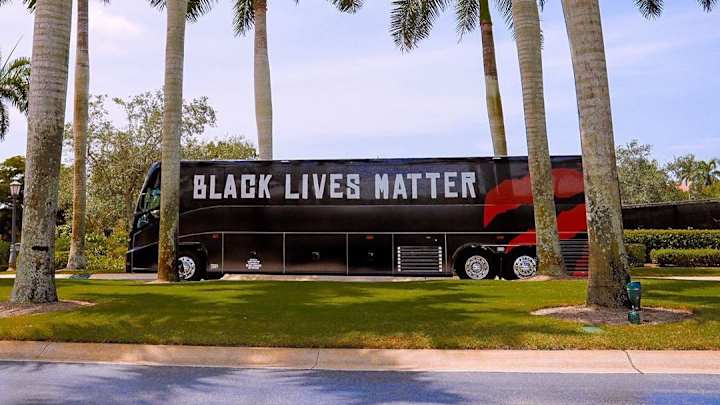Raptors' diversity leading to productive social conversations

Diversity has been one of the hallmarks of the Toronto Raptors under president Masai Ujiri.
It's permeated throughout the front office, where Ujiri has not shied away from hiring racial minorities and women. On the court, the story is similar, as the Raptors have looked around the world to bring in some of the NBA's most talented players.
That diversity has led to some important conversations over the past few months as many parts of the world continue to grapple with legacies of systemic racism and social injustice.
"It's definitely huge that we have such a diverse team and everyone has their own perspective about what's going on," said Raptors wing Patrick McCaw. "It's great, just a melting pot of people who know what's going on and share their thoughts well and talk about what's going on and know that things need to change."
The 24-year-old McCaw said he plans on wearing "Say Their Names" on his jersey when the season returns. He's hoping to remind the public about those people who have lost their lives due to police brutality and racial violence over the past few years.
"So many names every from past years to now," McCaw said. "Now is just at the most pivotal time in history. Right now is [about] making the change and doing better for our community and making things happen for us. So it's huge just to understand the people who have been affected and still are being affected by social injustice and systematic racism and things like that."
The Raptors formed a committee of two players and two staff members to help lead the conversations about social injustice around the world.
For the 34-year-old Marc Gasol, social injustice isn't just an American or North American issue, it's something he said he's seen back home in Spain and throughout Europe.
"It's definitely a worldwide issue, obviously," he said. "It spiked here in the US, with all the very unfortunate events that happened, but it's a worldwide issue, and we look at each society, each community and you can see the systemic racism that is there, and I think it's our responsibility, our duty to hit it head-on, and we can. There shouldn't be anybody that shied away from that. I've lived it at levels in Europe, I've seen it with my own eyes, and it's time to say enough is enough and we've got to demand a change, especially as far as process and systems go, how everything is set up, so we can educate the next generations on how to treat other human lives. To me, it's pretty simple, it's be more responsible as human beings."
In Europe, Gasol said he sees racism targeted toward immigrant communities, mostly those who have emigrated from Africa.
"I don't think people in Europe have to look only to the U.S.," he said. "I think we can see how we treat a lot of immigrants that come from Africa to Europe. The way we do it, not me, but the way a lot of people do, sadly, in Spain or Italy or other countries around Europe, we look at them as immigrants, not only as human beings. So that tag that you put on already tells you a lot of stuff about the way you view them. So, I feel all those things need to change and it has to come, if not from the top, from the government, it has to come from the people. So hopefully, we can impact positively and respectfully to those changes and promote the change."
These conversations aren't going to end once the season starts and players return to the court with social justice messages on their jerseys. For the Raptors, change is something they're working to create far away from the court.
"It's much bigger than [the jersey]," McCaw said. "It's just a conversation about what's going on in our world and just making a change and just showing as a team what we want to do and use this platform the right way."
